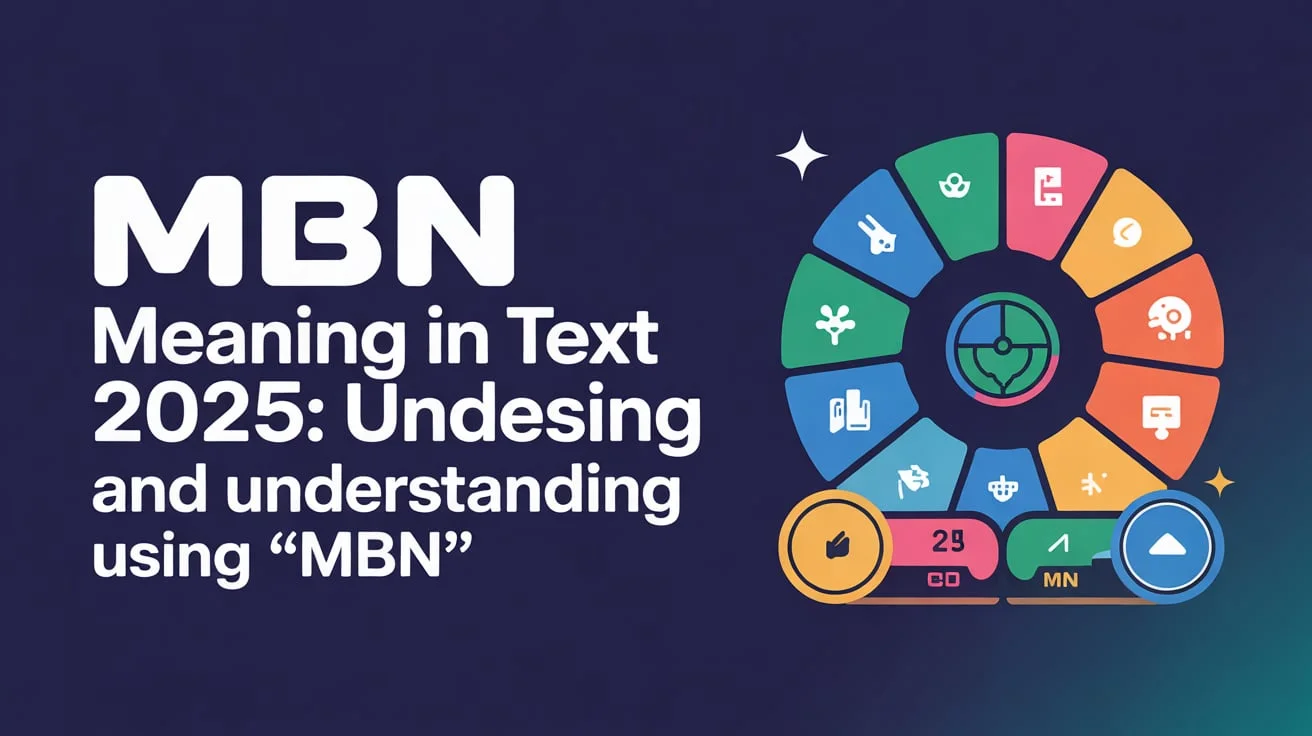In the fast-moving world of texting and social media, acronyms pop up everywhere. One you’ll frequently see is “MBN”. But what does MBN mean exactly? How do you use it correctly? How has its meaning shifted by 2025? This article walks you through the acronym—from its origin to tone, to when it works (and when it doesn’t).
Definition: What Does “MBN” Mean?
At its core, MBN stands for “Must Be Nice It’s a quick way of acknowledging that someone else has something desirable—though whether you’re sincerely admiring or lightly mocking depends on context.
Here are key points to understand:
- It’s informal, used in texting, comments, chats.
- It often communicates envy or admiration: you see someone with something you don’t, so you say “MBN”.
- It can also carry sarcasm or irony, especially when the scenario is less enviable than it appears.
Less common meanings exist (in other contexts “MBN” might stand for something unrelated), but for texting and social media in 2025 the “Must Be Nice” sense is overwhelmingly dominant.
Origin & Evolution of “MBN”
From Phrase to Acronym
The phrase “must be nice” has long been used in speech to express either genuine admiration (“Wow, you got to meet your idol — must be nice”) or passive-aggressive envy (“You took off three weeks for vacation — must be nice”).
With digital communication, brevity became king. The initials MBN started showing up in chats, comments, and hashtags. For example, on platforms like Instagram and TikTok, you’ll find posts tagged “#MBN” when someone wants to quickly express “that must be nice”.
Cultural Acceleration
In the 2010s and 2020s, social media grew globally. Slang spread faster. Acronyms like MBN moved from private chats into public posts and comments. The fact that it’s short made it ideal for quick responses, particularly where tone and context carry meaning.
By 2025, MBN has become broadly understood across many English-speaking circles and even beyond. That said, the nuance (friendly vs sarcastic) still depends on the user ad context.
How “MBN” Is Used in Texting & Social Media
Tone & Intent
Understanding the tone behind “MBN” is key.
- Genuine admiration:
Example: “You got the promotion — MBN!” (Here you’re happy for them.) - Sarcastic or envious:
Example: “Oh youre on a private jet again? MBN…” (Here you’re hinting jealousy or the opposite of happy.)
So while the acronym stays the same, the vibe changes based on context and punctuation.
Platform-Specific Usage
Here’s how MBN typically shows up across platforms:
| Platform | Typical Use Case | Notes |
| Text / WhatsApp | Quick reaction between friends | Tone is evident by relationship |
| Instagram Comments | Under posts of luxury, travel, success | Often accompanied by hashtag #MBN |
| TikTok Videos | Used in captions or comments reacting to someone’s lifestyle shot | Visual context adds meaning |
| Work Chat (Slack etc) | Rare & risky | Could come off as passive-aggressive |
Common Mistakes & Misinterpretations
Here are pitfalls to watch:
- Tone misread: Without facial cues or shared history, “MBN” can seem mean rather than friendly.
- Wrong context: Saying MBN when someone shares something sensitive (illness, loss) can offend.
- Professional misuse: In formal settings, it may read as unprofessional or sarcastic.
- Confusing meanings: While rare, someone unfamiliar with slang might misinterpret MBN as something else.
MBN in 2025: Trends, Regional Usage & Cultural Nuances
Global Spread & Variation
By 2025, digital slang like MBN crosses borders. In many English-speaking and international communities, people know what it means. But regional differences still exist:
- In some non-English speaking countries, people might use the English acronym without fully grasping nuance.
- Local slang might take over, so MBN might appear less often or alongside local equivalents.
Slang Landscape in 2025
Online slang evolves quickly. According to a glossary of 2020s slang, acronyms and terms shift in popularity and meaning. MBN remains stable because it’s simple and versatile.
Memes & Visual Culture
In 2025, short-form videos and memes dominate. MBN often appears:
- Subtitled in videos: “MBN when you get the free upgrade”
- In memes reacting to other people’s enviable situations
- As a hashtag aggregator: posts about luxury or lifestyles tagged “#MBN” attract engagement.
Emoji & Tone Enhancers
Adding an emoji changes the vibe of MBN:
- 😏 or 🙄 → sarcasm
- 😊 or 🤗 → genuine admiration
- 😬 or 😅 → self-mocking (“MBN… but I still have to work tomorrow”)
When to Use (and When to Avoid) “MBN”
When It Works
Use MBN when:
- You’re in a casual setting, among friends or followers.
- The person you’re responding to knows you and understands your tone
- The situation involves something enviable, playful, or trendy (travel, purchase, lifestyle).
- You want a short, snappy reaction.
When to Avoid
Skip MBN when:
- You’re writing in a formal context (work email, academic).
- The person you’re responding to doesn’t know you well (tone may be misread).
- The post is about serious matters (health issues, tragedies).
- You want clarity over slang.
Safety Tips for Using MBN
- Check your relationship and context before hitting “send”.
- If tone could be ambiguous, add an emoji or comment further to clarify.
- Consider whether a more earnest phrase might be better.
- Remember: over-usage dilutes impact. Use MBN sparingly so it stays meaningful.
Read More: Sans Meaning in English: What It Really Means & How to Use It
Alternatives to “MBN” & How to Choose Them
If MBN doesn’t quite fit, here are alternatives you can use. Choose based on the tone you intend.
| Phrase | Tone | Best Used In |
| “Must be nice.” (full) | Neutral or slightly jealous | Casual writing, comments |
| “Lucky you!” | Friendly, admiring | Genuine celebration |
| “Good for you.” | Sincere, supportive | Both casual and semi-formal |
| “I wish I could…” | Self-deprecating/humorous | When you want to express mild envy |
Example usage:
- “You got that house? Lucky you!”
- “You finished already? Good for you.”
- “You’re off to Bali? I wish I could…”
By picking the right phrase, you match tone, relationship, and context more accurately than jumping to MBN every time.
FAQs About “MBN”
What does MBN stand for in text?
MBN = “Must Be Nice”.
Is MBN always sarcastic?
Not always. It can be genuine admiration, but more often it carries irony or envy depending on tone.
Can I use MBN at work?
Generally, no. In professional settings it may be misread as condescending or unprofessional.
How do I know if someone means MBN sincerely or not?
Look at context, relationship, punctuation, and emojis. A plain “MBN” can read passive-aggressive if tone isn’t clear.
Are there regional differences in meaning?
Yes. While the acronym is widely understood in English-speaking areas, in international contexts it may be used differently or less frequently.
Conclusion
In 2025, the acronym MBN (“Must Be Nice”) remains a staple of digital slang—short, expressive, and loaded with tone. Whether you use it to highlight admiration or lightly mock someone’s good fortune, knowing when and how to use it matters.
Here’s the takeaway: MBN works best in casual, friendly settings where the tone is obvious. If there’s any doubt about how it’ll land—say in a professional chat or with someone who doesn’t know you well—choose a clearer phrase instead. Use it sparingly, pick your tone, and you’ll stay fluent in today’s ever-shifting digital chat landscape.
Want help creating real-life examples, snippets for social-media posts using MBN, or screenshots and visuals to guide others? I’d be glad to build that for you.

Meet Mia Rose, the heart and hands behind the whimsical wonders at PunnyPeeks. With a keen eye for detail and a passion for creative expression, Mia turns balloons into art and events into unforgettable experiences. Whether she’s styling a dreamy wedding arch or adding a playful pop to a birthday party, her work radiates joy, color, and personality.




